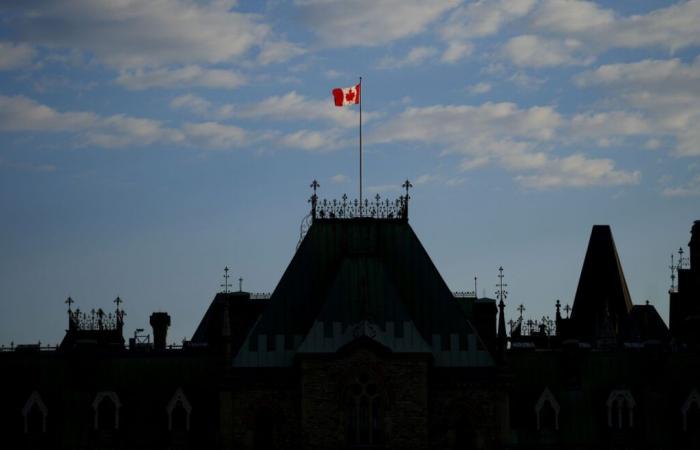In an economic statement that it presented in a hurry on Monday afternoon, Justin Trudeau’s government announced new spending, including nearly $1.7 billion to finance the Goods and Services Tax (GST) holiday of two months, in addition to revising the deficits upwards.
The federal deficit increases from 40 to 61.9 billion in 2023-2024 and from 39.8 to 48.3 billion in 2024-2025, we learned from reading the linked documents, which were kept secure looks under black sheets until early afternoon (rather than 10 a.m.).
Meanwhile, the Prime Minister’s office had been busy removing mentions of former Finance Minister Chrystia Freeland and members of her cabinet from the statement and press releases attached to it, which threw in the towel on Monday , shortly after 9 a.m.
Last March, Chrystia Freeland promised to maintain the deficit for the 2024-2025 financial year at 40 billion… before changing her mind last week.
Prime Minister Justin Trudeau tasked Liberal House Leader Karina Gould with tabling the budget statement in the House of Commons despite the chaos caused by Ms.me Freeland.
Costly GST holiday
The two-month GST holiday alone — effective from December 14, 2024 to February 15, 2025 on various foods, children’s products, written publications, games and seasonal items — will deprive the public purse of 1.656 billion in 2024-2025 , according to the latest forecasts from the Ministry of Finance.
“A family that spends $2,000 on eligible products, such as children’s clothing, shoes and toys, diapers, books, home snacks or restaurant meals, would pay $100 less GST over that period. two months,” we could read in the fall economic statement a few hours after the resounding departure of Chrystia Freeland, who said in particular that she was fed up with “expensive political tricks.”
Without also speaking of a “costly political trick”, the president and CEO of the Institut du Québec (IQ), Emna Braham, believes that the “economic impact” of the temporary TPS leave will be “relatively low”, or even “minimal”, since it arrives at a “time of high expenditure which would have taken place anyway”.
Unable to find support in the House of Commons, the Liberal government made no mention in its statement of the idea of giving a check for $250 to the approximately 18.7 million Canadian workers earning $150,000 per year or less.
Little money to strengthen the border in the short term
Faced with pressure from the President-elect of the United States, Donald Trump, the federal government is allocating 1.3 billion over six years to “protect the Canadian border”, including only 81 million for the current year.
“It’s a very low amount for this year,” points out University of Ottawa professor Geneviève Tellier. “The bulk of the sums are for the years to come. We are not sending the message that we want to calm Donald Trump in the short term. And he will probably blame us for that. »
Justin Trudeau’s team will also increase by 77 million the sums used to offer temporary housing to people seeking asylum in Canada.
That’s not all. Justin Trudeau’s team will allocate 51 million to “remove assault weapons from circulation” and 10 million to “protect women’s reproductive health rights” by March 31, indicates the Ministry of Finance .
Finally, the “evolution of the economic and budgetary context since the 2024 budget” will mean $3 billion less in state coffers by the end of the year 2024-2025.
“We must take the document for what it is: it gives a picture of the economic situation at the moment. But there are so many uncertainties. This is not a document that will be very useful,” warns political scientist Geneviève Tellier at the end of “a strange day.”
An “accounting revision” which explodes last year’s deficit
The Trudeau government is also making a major correction to the budget balance for the year 2023-2024, which ended last March.
The projected deficit was $40 billion. It widens to 61.9 billion — going from approximately 1.4% to 2.1% of Canadian gross domestic product (GDP).
“Exceptional” and “important” factors explain this increase, it is mentioned. First, the government is recording an amount of more than $16 billion in “provisions” to settle disputes related to discrimination suffered by indigenous communities. Also, the government considers that it will not be able to recover nearly 5 billion granted in the form of emergency loans to businesses during the pandemic.
“We must put into perspective” these sums which are “accounting entries”, underlines Geneviève Tellier, professor at the School of Political Studies at the University of Ottawa. “The government is now counting sums that it will have to spend in a few years,” she summarizes.
Justin Trudeau’s government has never presented a balanced budget since 2015, neither with Bill Morneau nor with Chrystia Freeland at the head of the Ministry of Finance.
Achieving a zero deficit appears to be an impossible mission for the new Minister of Finance, Dominic LeBlanc, to the extent that the deficits in the years to come will be greater than those anticipated in the last Freeland budget.
“And that’s perhaps what’s most worrying,” believes M.me Tellier.
The government is encroaching on “the red line that it itself has drawn,” observes Emna Braham of the IQ. A year ago, Chrystia Freeland announced three “budgetary anchors” that her government was committed to respecting.
He only partially succeeds. The dollar amount of the deficit is growing much more than expected. But the deficit relative to GDP is falling over the next few years, as is the debt relative to GDP.
“For the moment, there is no loss of control,” says Emna Braham. “But there are significant elements of risk,” notes the economist, referring in particular to the threat brandished by Donald Trump to impose customs tariffs on Canadian imports to the United States. “In this current context, we must leave ourselves some room to maneuver to deal with a possible crisis. However, it is not certain that we currently have one. »
The leader of the Conservative Party of Canada, Pierre Poilievre, does not see things the same way, calling the deficit “out of control.” “It’s a debt ravine that threatens the future of Canadians. This is why we are announcing today that we are going to vote against this plan and that we hope that the NDP will [suivre] “, he said in the room today.
According to the Bloc Québécois, “the economic statement [de l’automne 2024] will go down in history, but for the wrong reasons.” “This is the first time that a government is divided to the point where a Minister of Finance refuses to present the exercise, refuses to take responsibility for it and resigns with a bang,” argued the party’s parliamentary leader, Alain Therrien.
With Anaïs Desjardins






